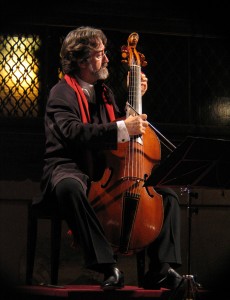
Early-music standouts on way to Miami Bach Society
Looking ahead again to the coming season, the Miami Bach Society will have an impressive gathering of early music performers paying us a visit. A visit or two, if you’re talking about Jordi Savall (pictured above), the Catalan master of the viol who came to wider prominence with his work on Alain Corneau’s 1991 film “All the Mornings of the World.” That movie concerned the life of Marin Marais (1656-1728), one of the most important viol players in French musical history, who had a long career in the service of Louis XIV and his great-grandson, Louis XV.
Savall will be in town twice, the first time Oct. 16 accompanied by his son Ferran, who plays the theorbo, a long-necked lute, in recital at the New World Center. Savall then returns in March for the Tropical Baroque Festival XIII, set for March 3 through 11 at the Biltmore Hotel in Coral Gables. There, the gambist will be joined by Hesperion XXI, his performing ensemble.
Other big names coming to the festival include Anonymous 4, the female quartet from New York that will be celebrating its 25th anniversary during its current tour. Its performance on March 8 will be an anthology program of the whole scope of its repertoire, from 11th-century chant to contemporary music. It will also include 19th-century American shape-note music, which was featured on one of the most popular of its 20-plus recordings, “American Angels.”
Claude Bolling, the French pianist whose classical-jazz crossover works, such as the “Suite for Flute and Jazz Piano,” were runaway recording hits in the 1970s, appears at the festival with his trio, as does Concerto Soave, an excellent French group founded by Jean-Marc Aymes and featuring the Argentine soprano Maria Cristina Kiehr.
From Germany comes the Baroque orchestra Elbipolis, which likes to do fun things like experimental dance club concerts featuring 18th-century music. And Fuoco e Cenere, the Paris-based ensemble founded by the fine viol player Jay Bernfield, is a regular part of the festival and will be returning once again.
Local trumpeter Brian Neal will bring his Brass Miami to the festival, and there also will be an appearance by Asteria, the New York-based team of soprano Slyvia Rhyne and lutenist and tenor Eric Redlinger. They’re scheduled to sing pieces from the important 15th-century collection known as the Dijon Chansonnier.
YouTube and similar sites make researching performers a delightful task, as in this video of Asteria singing an anonymous song called “Quant la doulce jouvencelle,” which basically says: If this sweet young girl says she loves me, who am I to turn her away? This is a beautiful song, masterfully sung and played.
Also this season, the Society’s founder, Donald Oglesby, leads two concerts with the University of Miami’s Collegium Musicum at St. Thomas Episcopal, beginning Nov. 5 with the Requiem of André Campra and Bach’s Cantata 131 (“Aus der Tiefen rufe Ich”). In April, Oglesby will lead the group in his new edition of the Michel de Lalande’s “Pange Lingua,” noted for its bold harmonic experimentation.
The society wraps the season May 20 with a concert by Tony Boutté’s Arcanum, founded in Miami last year. The group’s program features music from Bach’s “Notebook for Anna Magdalena Bach,” his second wife and, apparently, a good musician in her own regard.
Early music has been a growth industry in the classical world, and it’s not uncommon these days to see young players at home behind theorbos or sackbuts, when not all that long ago they would have been the domain of obscure specialists. There are now a remarkable number of groups that focus on Baroque and Renaissance traditions, and the Miami Bach Society will present several of the outstanding ones in the season to come. People like me can hardly wait.
Recent Content
-
Artsarticle ·
-
Artsarticle ·
-
Artsarticle ·

